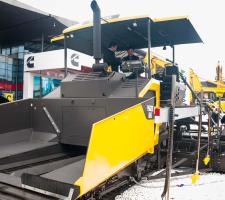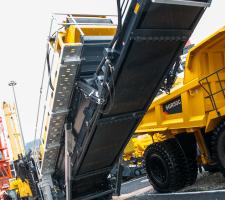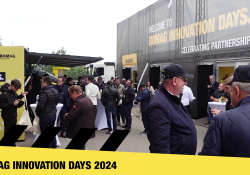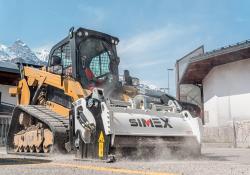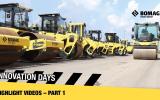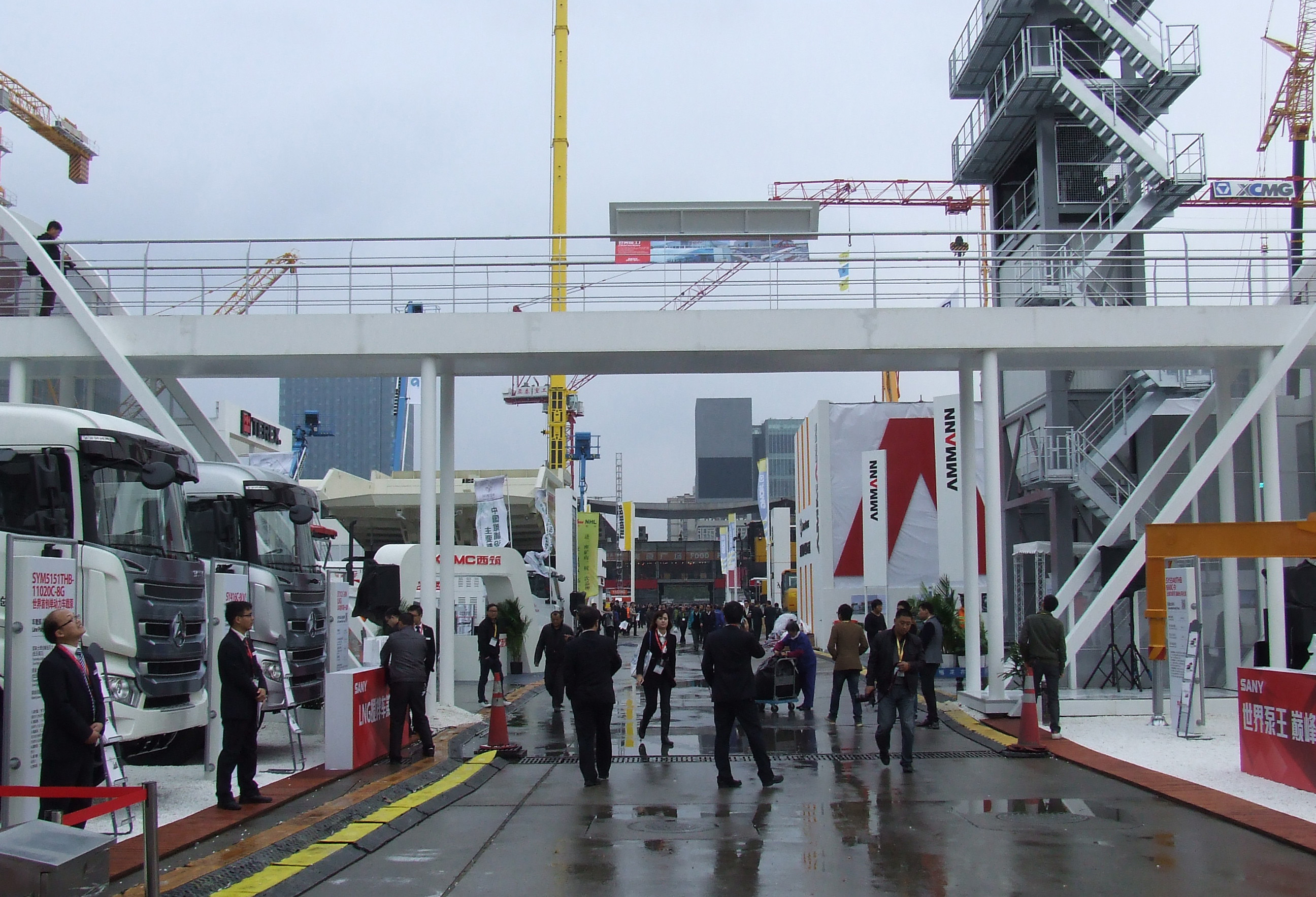
Rain showers on the first day failed to dampen the enthusiasm to see new construction machines at bauma China
Even heavy rain showers on the first day of the bauma China exhibition in Shanghai did not dissuade the crowds packing the outside exhibition areas - Mike Woof writes
Those firms exhibiting at5930 bauma China 2014 in Shanghai benefited from a strong show that attracted a record attendance of 191,000, an increase of 6% over the 2012 event. A wide array of new equipment was on show from the 3,104 firms exhibiting, an increase of 14% from 2012. There was a strong focus on technology and new engines required for the coming emissions regulations for China. Despite the rows of shiny machines and the numerous new model launches, the Chinese construction market however, is not in a strong state at present.
For Chinese equipment manufacturers these are tough times, with many massive new factories operating at low output. Worse still, there are large numbers of comparatively new machines with low hours sitting in plant yards across the country. Most Chinese manufacturers are reliant on the home market, with comparatively low export percentages and in any case, many of the emergent territories where these companies have previously found sales are seeing reduced levels of construction activity. What will happen next is hard to judge but it is clear that some Chinese manufacturers may not survive.
For those Chinese firms with greater resources, new strategies are being established that will help them in the long term. For2490 XCMG, its new approach is seeing the firm enter a wider field of business operations. One such move is its plan to increase its share of the extraction industry segment, with new machines in the shape of its large excavator, 50tonne class wheeled loader and its 45tonne class articulated dump-truck. Hanson Liu, assistant president and general manager of XCMG, explained that this widening shift also reflects the firm’s transition from being an equipment supplier to becoming a solutions provider, a vital change in approach for markets such as the extraction industries.
1170 SANY is also increasing its focus in haulers for the extraction sector, with a brand new 40tonne class ADT and revamped 95tonne class rigid truck at the show.
269 LiuGong too is seeking to boost its share of the extraction equipment markets, also introducing a 50tonne class wheeled loader. Zeng Guang’an, chairman of LiuGong Machinery and president of parent LiuGong Group explained, “LiuGong is now building bigger machines and targeting mining and quarrying. There are a smaller number of competitors like 178 Caterpillar or 2300 Komatsu and this is a more profitable segment than the volume market.” The firm is looking to expand its worldwide coverage, particularly in markets such as the CIS, Africa, the Middle East and Latin America. The company will also capitalise on its joint venture agreement with 6934 Metso, introducing new mobile crushers at bauma China. While track-mounted mobile crushers only account for a small percentage of the Chinese market at present, both LiuGong and Metso believe these versatile units will replace many of the fixed plants as older generation equipment comes up for renewal.
4897 Shanbao similarly believes the market for mobile crushers in China to be ripe for expansion. Following Shanbao’s acquisition by 325 Sandvik, the Chinese firm has had more resources available for new model development. At bauma China the firm exhibited its new range of track-mounted machines designed and developed in China. Olivia Weng, international sales director explained that the crusher can be used in an array of applications. She said, “We developed a mobile machine as it’s more versatile than a fixed plant.”
1175 Zoomlion too is expanding in the extraction sector, with a new two-in-one systems solution dry mortar mix plant coming to market. This is a product of its purchase of German dry mortar equipment producer 7557 M-TEC late last year. By using manufactured sand instead of river sand this novel plant eliminates the drying stage, reducing both infrastructure and production costs. Zoomlion is keen to emphasise the environmentally-friendly credentials of the product. "It represents the future of the industry," said Su Zimeng, secretary-general of China Construction Machinery Association. And Zoomlion is broadening its field of operations to include areas such as environmental protection and heavy duty trucks.
At the same time Shanghai-based6928 Lonking’s strategy includes developing a components supply business for other OEMs, while it has also designed a high specification wheeled loader with export needs in mind.
In addition, LiuGong has also invested heavily in a new research and development facility, spending some 400 million RMB in recent years. Vice president Dave Beatenbough explained that the facility will be key to the firm’s future product range and said, “Anybody can bolt parts together and make an excavator. For better fuel economy you have to integrate the engine and the hydraulics.” And he added that the sophisticated electronics and software that will facilitate this machine integration will be developed by LiuGong itself.
For foreign firms, there are some market segments in China and other areas of South East Asia that are still in a better state of health than general construction. Road maintenance is one of the markets with steady sales. It is of note that both the French2779 Fayat Group, parent of the 172 BOMAG brand, and the rival German 364 Wirtgen Group are seeing increased market shares in China. And Japanese company 2714 Sumitomo as well as the Swiss firm Amman and Swedish company 359 Volvo CE are also keen to capitalise on this business segment. All five firms broadly agree that increasing numbers of Chinese customers are opting to buy quality machines for their longer term road contracts.
Ulrich Reichert, CEO and managing director of Wirtgen China said, “We are developing machines for the Chinese market.” He explained that while these models are more expensive than local machines they retain the firm’s high quality but at a lower price than models built in the company’s German factories.
Built in Wirtgen’s Chinese facility, the228 Hamm 318 soil compactor has been designed and developed in China to meet the need for a quality machine at an affordable price. As many Chinese roads feature a cement stabilised base, the reclaimer/stabiliser is a necessary tool and Wirtgen hopes to achieve strong sales for the WR250, which can be matched with the 318 roller for job sites. Wirtgen’s joint president Stefan Wirtgen said that the group has already grown its business in China by some 20%. Fayat’s marketing manager Jacques Bonvallet explained that Chinese contractors are keen to invest in high quality equipment with better performance and improved working life. And he added that the country will be shifting its focus towards road maintenance machines, triggering a change in the size of equipment favoured favoured in the process.
2714 Sumitomo meanwhile has developed a larger, high-performance paver to meet the needs for productive highway class machines outside of its Japanese home market. The new HA90C-2 is based on the earlier HA90C paver and shares a common design and layout with the existing and well-proven HA60C/W. Like the new BOMAG BF800C and 1194 Vögele Super 2100-3, the new Sumitomo paver is offered in China with a larger hopper to cope with the needs of Chinese contractors, and the larger trucks they use for carrying asphalt.
Meanwhile the2719 Chinese Government is keen to capitalise on developments in asphalt technology to cut costs and boost quality. Warm asphalt and recycled asphalt pavement (RAP) systems are both now being favoured, due to the energy savings and the reduction in material wastage.
The 240tonne/hour SLB3000 plant from Chinese company SANY has been specifically designed to meet the need for warm mix asphalt, with the firm supplying one of these reduced fumes and dust emissions units for use in an inner city area.
The Fayat Group is now offering its 6tonne273 Marini mixer in China for example, as this large unit is well-suited to the longer mix times required for recycled asphalt applications. With RAP stockpiles having reached some 100 million tonnes in China, Bonvallet said that the authorities recognised the potential cost savings and environmental benefits from using this material.
Demand for sophisticated asphalt technology can be noted in various parts of South East Asia and Amman won a significant order from a customer in Thailand for one of its plants at bauma China 2014. The plant is being supplied to a major Thai contractor, located around one hour’s journey from Bangkok. The customer has an older generation plant that will be retained, but is buying the newer Amman plant to help boost production and quality. Song Yik Chong, regional director for South East Asia commented, “It’s a standard design machine, which helps keep the price down. We still produce the main components at our factory in Switzerland like the dryer, the burner, the screen, the filter and the mixer. We send these to our factory in Shanghai to do the steelwork and the assembly.”
Those firms exhibiting at
For Chinese equipment manufacturers these are tough times, with many massive new factories operating at low output. Worse still, there are large numbers of comparatively new machines with low hours sitting in plant yards across the country. Most Chinese manufacturers are reliant on the home market, with comparatively low export percentages and in any case, many of the emergent territories where these companies have previously found sales are seeing reduced levels of construction activity. What will happen next is hard to judge but it is clear that some Chinese manufacturers may not survive.
For those Chinese firms with greater resources, new strategies are being established that will help them in the long term. For
At the same time Shanghai-based
In addition, LiuGong has also invested heavily in a new research and development facility, spending some 400 million RMB in recent years. Vice president Dave Beatenbough explained that the facility will be key to the firm’s future product range and said, “Anybody can bolt parts together and make an excavator. For better fuel economy you have to integrate the engine and the hydraulics.” And he added that the sophisticated electronics and software that will facilitate this machine integration will be developed by LiuGong itself.
For foreign firms, there are some market segments in China and other areas of South East Asia that are still in a better state of health than general construction. Road maintenance is one of the markets with steady sales. It is of note that both the French
Ulrich Reichert, CEO and managing director of Wirtgen China said, “We are developing machines for the Chinese market.” He explained that while these models are more expensive than local machines they retain the firm’s high quality but at a lower price than models built in the company’s German factories.
Built in Wirtgen’s Chinese facility, the
Meanwhile the
The 240tonne/hour SLB3000 plant from Chinese company SANY has been specifically designed to meet the need for warm mix asphalt, with the firm supplying one of these reduced fumes and dust emissions units for use in an inner city area.
The Fayat Group is now offering its 6tonne
Demand for sophisticated asphalt technology can be noted in various parts of South East Asia and Amman won a significant order from a customer in Thailand for one of its plants at bauma China 2014. The plant is being supplied to a major Thai contractor, located around one hour’s journey from Bangkok. The customer has an older generation plant that will be retained, but is buying the newer Amman plant to help boost production and quality. Song Yik Chong, regional director for South East Asia commented, “It’s a standard design machine, which helps keep the price down. We still produce the main components at our factory in Switzerland like the dryer, the burner, the screen, the filter and the mixer. We send these to our factory in Shanghai to do the steelwork and the assembly.”

